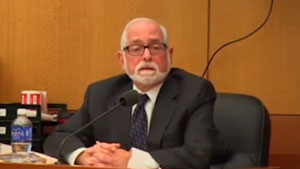

The Expert: Dr. Ian Newmark, a New York pulmonologist, details how he believes the healthcare providers’ treatment fell below the standard of care.

Testifying in a 2015 Georgia medical malpractice trial, Dr. Ian Newmark, a pulmonologist and critical care specialist from New York, details his belief that the defendants’ treatment fell below the standard of care.
This trial involved a woman who had a kidney removed. During that operation, the surgeons inadvertently ligated, or tied off, the abdominal aorta, and the complication went unrecognized. Postoperatively, the patient complained of extreme pain, numbness, and paralysis of her lower extremities, but the doctors and nurses seemingly performed inadequate examinations and no investigations into these complaints for two days. By that time, the patient had lost the use of her other kidney as well as her legs. She died after a five-month struggle.
Newmark addresses the care by the specialists involved in the immediate post-operative period. Speaking with the calm confidence, clarity, and unwavering authority that one would expect of an excellent testifying expert, his many years of experience in critical care are apparent as he hammers home the negligence of two of the physicians involved as well as the nursing staff.
The expert begins by explaining how the lower extremities should have been examined by any doctor initiating post-operative management. This would include checking the lower extremities for swelling, sensation, and pulses. The defendant, who was a nephrologist, admitted to simply looking at the extremities. The expert concludes that this violated the standard of care for such doctors. The first defendant apparently documented that he had spent 35 minutes in caring for the patient. Further, in deposition he admitted to spending less than five minutes on the leg examination, despite the fact that a nurse had documented that she had informed the doctor of cold, paralyzed, sensationless legs. This warning should have alerted all caretakers to perform a thorough evaluation including a careful look at motor strength, pulses and neurologic findings. Additional testing, the expert maintains, should have been considered or ordered, including urgent consultation with a vascular specialist. Nonetheless, no action was taken that day.
The second defendant doctor, a critical care specialist that the first had called in on suspicion that the patient was having a pulmonary embolus, fell under Newmark’s criticism as well. This doctor failed to fully examine the patient’s lower extremities. Indeed, most pulmonary emboli originate in the legs, so if that diagnosis is being considered, it is imperative to feel them for abnormalities. Additionally, it appears from documentation that the nurse taking care of the patient had informed the critical care doctor of the problems with the patient’s legs, yet he did not check her neurologic or vascular integrity, and did not call any other specialist. The expert sees this as negligent and outside of the standard of care.
Finally, Newmark looks at the fact that the nursing staff had documented continually normal lower extremity pulses in a patient whose aorta was ligated. He concludes that the normal pulses reported were not possible and that the nursing staff documenting this data had not really done the examination.
Given the patient’s problems with cold, weak, sensationless lower extremities, Dr. Newmark concludes that any internal medicine doctor (and both of the previously mentioned doctors were certified internists) should be aware that something catastrophic had happened either from a neurologic, vascular, or intraoperative technicality, and should know the basic workup for these possibilities. Further appropriate steps include a sonogram or CT scan, as well as evaluation by a vascular specialist, none of which was forthcoming.
His testimony helped deliver a $36 million verdict for the plaintiff.
Gary Gansar, MD, is residency-trained in general surgery. He served as Chief of Surgery and Staff at Elmwood Medical Center and on the Medical Executive Committee at Touro Infirmary and Mercy Hospital in New Orleans, LA. Dr. Gansar was Board Certified in general surgery while in active practice. He joined AMFS in 2015 as a Physician Medical Director.
The medical expert witness partner for attorneys serious about building a winning case
AMFS is your trusted source for highly-qualified medical expert witnesses. After pioneering the field nearly three decades ago, we’re continuing to redefine medical expert witness services by providing value far beyond a referral alone.
Our Physician Medical Directors know what it takes to build a strong case. Our medical expert witnesses leave no doubt. And our case managers streamline billing and logistics every step of the way, letting you focus on what you do best: constructing your winning case. Explore why AMFS clients expect more from their medical expert witnesses—and get it.
